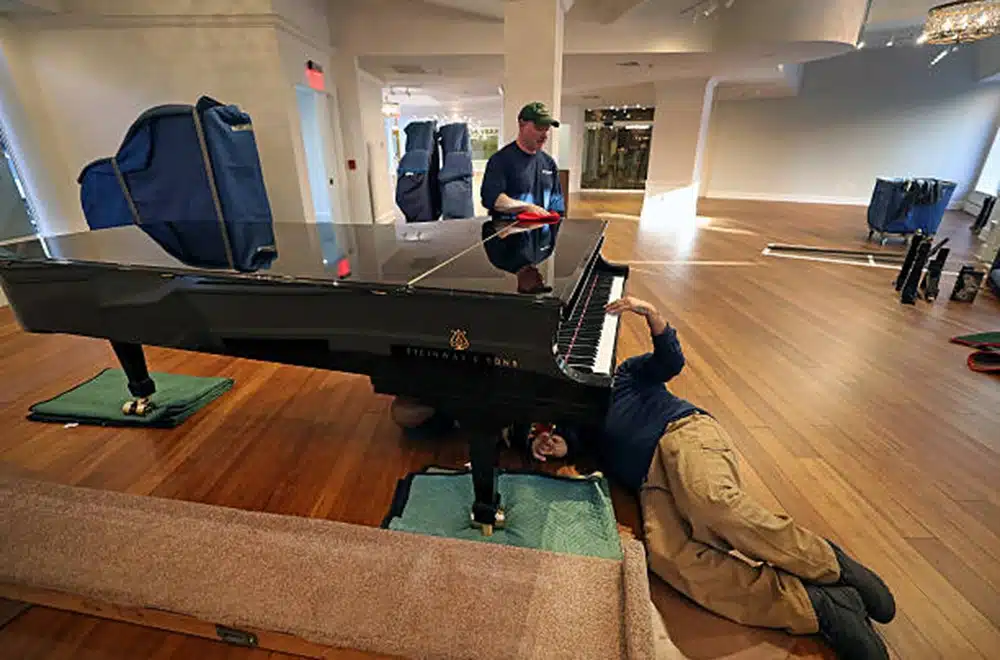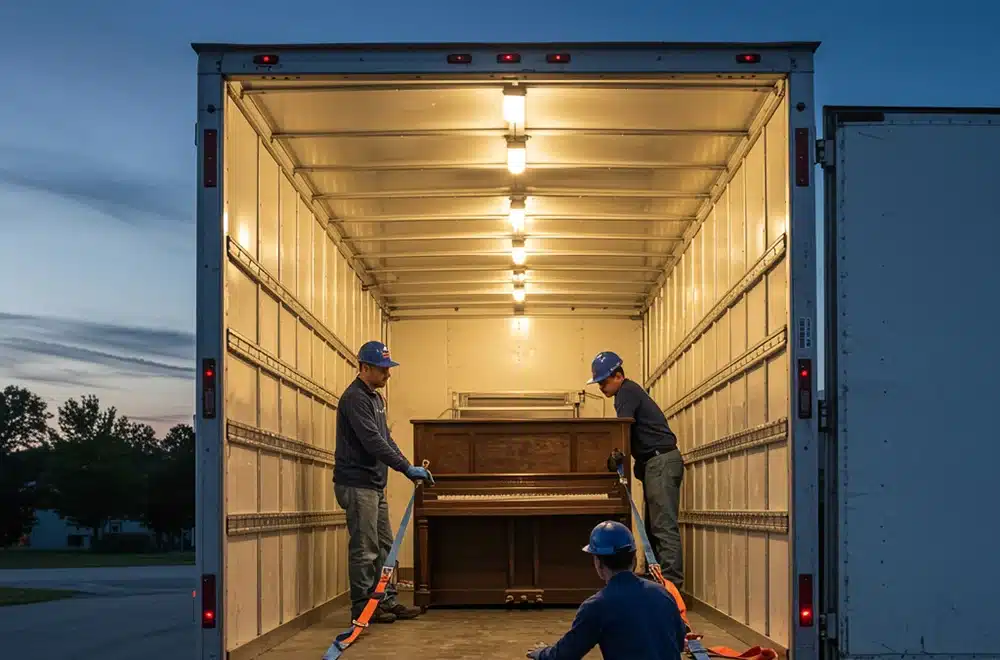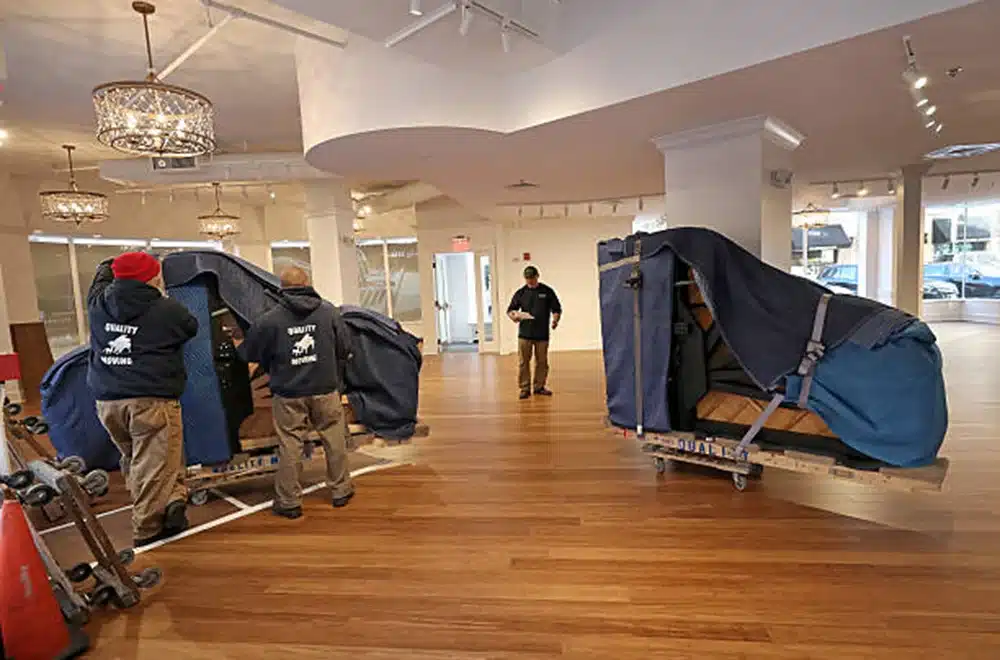Navigating Houston’s humid weather poses unique challenges, especially when moving delicate items, including pianos. The moisture in the air can lead to swelling and sticking of piano components, which might affect the sound and longevity of your beloved instrument. Understanding how to manage these conditions effectively is crucial for anyone planning a piano relocation in or around the city.
We start by examining the effects of Houston’s high humidity on pianos, detailing how persistent exposure to moisture can cause harm. This knowledge prepares us for the preventive steps needed during the move and informs our long-term maintenance strategy to keep your piano in top condition post-move. Our expertise as professional piano movers allows us to implement protective measures that ensure the safety and integrity of your instrument, regardless of weather challenges.
Our approach centers on meticulous planning and execution. From choosing the right materials for wrapping your piano to controlling the environment during transport, we uphold the highest standards to mitigate humidity-related risks. By the end of this discussion, you will have valuable insights into the specific precautions and strategies we implement to safeguard your piano during humid conditions in Houston.
Understanding Houston’s Humidity and Its Effects on Pianos
Houston’s humidity is notorious for its impact on sensitive musical instruments, particularly pianos. The moisture in the air can cause the wooden parts of a piano, such as the soundboard and framing, to swell and contract. This affects the sound quality and can lead to longer-term damage if not properly managed. The keys might stick, and the tuning can become unstable, requiring more frequent adjustments than in less humid environments.
To tackle these challenges, we take specific measures from the moment we collect a piano for transport. We monitor the humidity levels closely and use specialized packaging materials that help shield the instruments from sudden changes in moisture. Our goal is to maintain a stable environment for the piano throughout its journey, regardless of the outside humidity levels.
Key Strategies for Protecting Your Piano Before and During the Move
To ensure your piano’s safety and integrity during transport, especially in humid climates like Houston’s, we employ several key strategies:
Pre-Move Conditioning:
Before the move, we recommend maintaining a stable humidity level in the piano’s environment. A dehumidifier or a specialized piano heater can help acclimate the instrument, making it less susceptible to relocation stress.
Protective Wrapping:
We use high-quality, moisture-resistant wraps and padding to further insulate your piano. This minimizes exposure to humidity and temperature fluctuations that can occur during the transit.
Climate-Controlled Transportation:
Our vehicles are equipped with climate control systems that maintain a consistent internal environment, which protects the piano’s wooden components from the effects of Houston’s humidity.
These strategies are integral to our moving process. We handle every phase with the utmost care, ensuring that your piano arrives in perfect playing condition and is ready to bring music into your new home.
The Role of Professional Piano Movers in Humid Conditions
Moving a piano in Houston’s intense humidity requires more than just physical strength; it demands expertise and precision. We understand that the high moisture levels can drastically affect the wooden components of pianos, potentially leading to swelling, sticking keys, or worse. Our team is trained to manage these challenges effectively. We use moisture-barrier wraps and climate-controlled vehicles to maintain a stable environment around your piano throughout the move. By doing so, we mitigate the risks associated with humidity and ensure that your piano retains its integrity and sound quality.
Furthermore, our crew is equipped with tools and techniques for maneuvering pianos safely in slippery conditions, a common issue during Houston’s humid months. Ensuring your piano’s safety isn’t just about protecting it from bumps and scratches; it’s about understanding and controlling the environment during transport.
After the Move: Tips for Piano Care in a New Environment
Once we’ve successfully moved your piano to its new location, maintaining its condition doesn’t stop there. Adjusting to a new environment, especially if it differs significantly in humidity or temperature, is crucial for the longevity of your piano. We recommend waiting at least a month before tuning your piano after it has been moved, as this period allows it to acclimate to the new surroundings. This is particularly important in areas with high humidity, like Houston.
To further protect your piano, we suggest using a dehumidifier in the room where the piano is placed if the area is known for high humidity. Regularly monitoring the room’s climate can prevent most humidity-related issues, such as warping or internal damage. Additionally, consider scheduling regular maintenance checks. These simple steps can significantly contribute to preserving your piano’s life and ensuring it continues producing beautiful music for years.
Wrapping Up the Safe Transportation Journey
Ensuring your piano’s safe transport and ongoing care in a city known for challenging weather conditions requires a dedicated and knowledgeable approach. By selecting optimal moving times, preparing meticulously for humidity challenges, and establishing a stable new environment, we safeguard your valuable instrument throughout its journey and beyond.
If you’re preparing for a move or need expert advice on caring for your piano in Houston’s unique climate, do not hesitate to reach out to us. At Piano Movers of Houston, we’re committed to providing top-tier service, ensuring your piano’s safety and sound quality no matter the destination. Let our Houston piano movers help make your next move a harmonious experience.
Related Posts

Preparing Your Piano for a Move: What Professionals Do Before It Leaves

Move Your Piano in a Climate-Controlled Transport: Why It Matters
